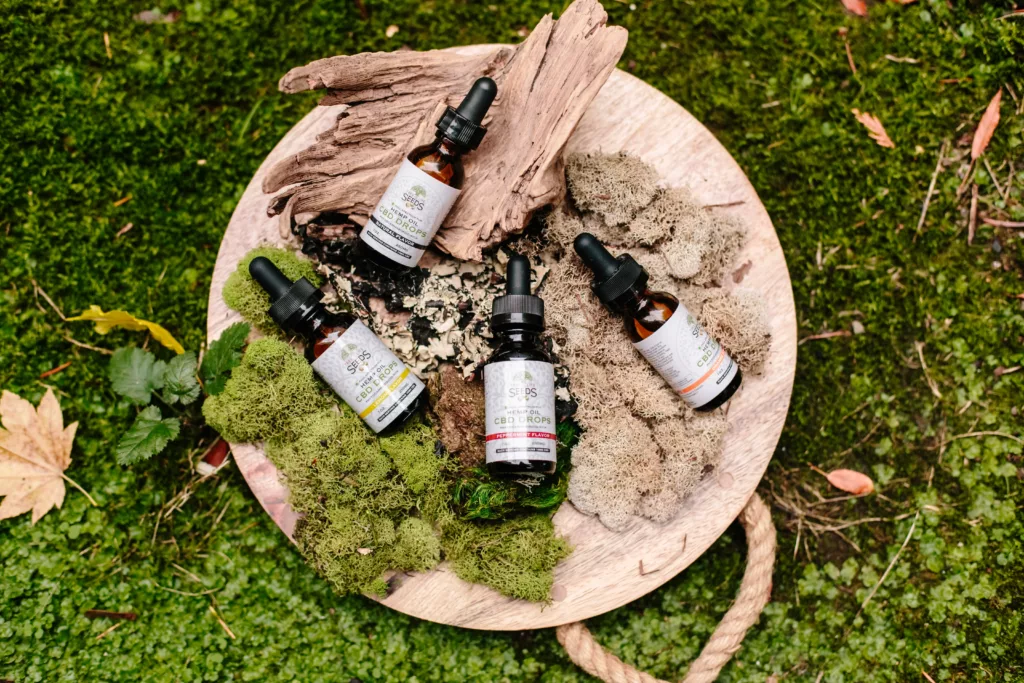
Are you curious about spearmint vs. peppermint essential oil? Look no further! In this article, we will explore the unique characteristics of these two aromatic oils and how they differ from each other.
Whether you’re a fan of invigorating scents or seeking a calming aroma, understanding the distinctions between spearmint and peppermint essential oils can help you choose the perfect oil for your needs. The fresh, sweet, and slightly minty aroma of spearmint essential oil is well known in the world of aromas and scents
It smells pleasant and delicate, often compared to candy or chewing gum. On the other hand, the aroma of peppermint essential oil is more potent and has a cooling effect. It is frequently compared to the freshness of toothpaste or breath mints due to its stronger, more minty scent. Therefore, depending on whether you prefer a softer scent or need that extra kick of coolness, the difference in scent between peppermint and spearmint essential oils can be crucial.
In terms of chemical composition, both spearmint and peppermint essential oils contain menthol as their main component. However, they differ in their levels of menthol concentration. Peppermint essential oil has a higher menthol content compared to spearmint essential oil, which contributes to its stronger aroma and cooling sensation. Each oil has unique characteristics that are attributed to carvone and other compounds. The sweeter scent and possible digestive benefits of spearmint essential oil are due to higher levels of carvone. Knowing the chemical differences between spearmint and peppermint can help you make an informed choice when selecting between the two essential oils for various applications, such as aromatherapy or medicinal use.
Key Lessons from Peppermint vs. Spearmint
The essential oils of peppermint and spearmint both have calming and soothing properties.
The cooling properties of peppermint essential oil help to reduce anxiety by up to 50%.
Spearmint essential oil contains menthol, giving it a soothing and cooling sensation, and is beneficial for stress relief
Both oils have calming effects that can ease headaches and muscle aches while encouraging general relaxation.
Aromas and Scents of spearmint and peppermint
There is a slight difference between the aromas of spearmint and peppermint essential oils. Spearmint has a sweeter and milder scent compared to the more intense and cooling aroma of peppermint. Your emotions and mood can be affected by the various aromas. Spearmint essential oil is well known for its upbeat, revitalizing, and refreshing scent. It has a soft sweetness that may aid in calming the environment. The aroma of spearmint is frequently linked to feelings of tranquility and relaxation. It can promote stress reduction and mental clarity. The delicate scent of spearmint is also thought to help with focus and concentration. On the other hand, peppermint essential oil has a potent, instantly recognizable mint scent.
Your senses can be awakened by the fresh feeling that its cooling effect creates. Peppermint’s scent is known for its refreshing properties, which can provide an energy boost when you’re feeling tired or fatigued. The aroma of this oil is frequently used to encourage alertness and improve mental clarity. Both peppermint and spearmint essential oils have distinctive aromas that have different effects on how you feel. Using diffusers or personal inhalers to add these scents to your daily routine can help you create the relaxing or stimulating environment you want, depending on your preferences for the cool freshness of peppermint or the sweet undertones of spearmint.
Chemical Composition
Let us talk about the chemical makeup of peppermint and spearmint essential oils. You might want to look into the claim that these two oils’ molecular compositions are noticeably different. Chemical analysis of spearmint and peppermint essential oils reveals variations in their constituents, which contribute to their unique aromas and therapeutic uses. The main variations between the two are as follows:
Menthol: Peppermint oil contains a higher percentage of menthol compared to spearmint oil. Menthol is responsible for the cooling sensation often associated with peppermint. It has analgesic properties and can help relieve muscle pain and headaches.
Carvone: Spearmint oil is rich in carvone, while peppermint oil contains less of this compound. Carvone gives spearmint its characteristic sweet, minty aroma. Additionally, it has antispasmodic properties and can be used to treat digestive problems like flatulence or bloating.
Limonene: Both oils contain limonene, but it is more abundant in peppermint oil. Limonene provides a citrusy scent and has been studied for its potential anticancer effects and ability to support healthy immune function.
Menthyl acetate: This compound is found in higher concentrations in spearmint oil than in peppermint oil. The fruity aroma of spearmint is a result of menthyl acetate, which also has antimicrobial properties. The therapeutic applications of peppermint and spearmint essential oils are influenced by their different chemical compositions.
Because of its analgesic qualities, peppermint oil is frequently used to treat headaches, muscle pain, and discomfort brought on by cramps or spasms. When used in steam inhalation or chest rubs, it also works well to clear congestion due to its high menthol content. On the other hand, spearmint oil is frequently used for digestive problems like indigestion or nausea due to its high carvone content. It can ease discomfort by relaxing the muscles in the stomach. Additionally, spearmint oil has antimicrobial qualities that make it effective against bacteria or fungi, making it a potential component of natural skincare or cleaning products. The molecular structures of peppermint and spearmint essential oils differ noticeably, according to chemical analysis. Their distinctive aromas and therapeutic applications are a result of these variations. You can select the best oil for your unique needs and preferences by being aware of these differences.
Spearmint vs. Peppermint: Medicinal Properties
When it comes to medicinal properties, spearmint essential oil has its own unique benefits. It is known for its ability to relieve digestive issues such as indigestion and nausea. Additionally, it can help alleviate headaches and mental fatigue. On the other hand, peppermint essential oil also possesses distinct medicinal properties. It is highly effective in relieving muscle pain and reducing inflammation. Furthermore, it can provide relief from respiratory conditions like congestion and sinusitis.
Unique medicinal properties of spearmint essential oil

Learn about the incredible medicinal properties of spearmint essential oil and how they can help you feel more energized and refreshed. Spearmint essential oil is a major game-changer for digestion. It has been used for centuries to treat a variety of digestive problems, including bloating, stomachaches, and indigestion. The oil contains chemical compounds that have a calming effect on the muscles of the digestive tract, promoting smooth digestion and reducing discomfort. Additionally, spearmint essential oil is known for its ability to provide relief for headaches. Its cooling and refreshing properties help soothe tension and ease headache symptoms.
Simply dilute a few drops of spearmint oil with a carrier oil like coconut or almond oil, then gently massage it onto your temples or forehead for instant relief. The aroma of spearmint also has an invigorating effect that can help uplift your mood and alleviate stress, which can often be a trigger for headaches. Incorporating spearmint essential oil into your wellness routine can offer numerous benefits for digestion and provide relief from pesky headaches. Its unique medicinal properties make it a valuable addition to any natural medicine cabinet. So go ahead and give this refreshing oil a try—your body will thank you!
Read about the amazing benefits of turmeric.
The special health benefits of peppermint oil
Experience the invigorating and cooling properties of peppermint essential oil, like a refreshing breeze on a hot summer day, as it offers you unique medicinal benefits that will leave you feeling revitalized and refreshed. Peppermint oil has a wide range of benefits that make it an invaluable addition to your natural health toolkit. One of its key benefits is its ability to aid digestion. Peppermint oil can help alleviate symptoms of indigestion, such as bloating, gas, and stomach discomfort. It works by relaxing the muscles in the gastrointestinal tract, allowing for smoother digestion, and reducing the chances of experiencing digestive issues after meals. In addition to promoting healthy digestion, peppermint oil also has other remarkable medicinal properties. It is known for its analgesic and anti-inflammatory effects, which can provide relief from headaches and muscle pain when applied topically or inhaled through aromatherapy.
After a challenging workout or a long day on your feet, the cooling sensation brought on by peppermint oil is a welcome relief for sore muscles and joints. Furthermore, peppermint oil has been found to have antimicrobial properties that can help fight against harmful bacteria and fungi. This makes it useful in maintaining oral health by preventing bad breath caused by bacteria growth in the mouth. Overall, peppermint essential oil offers unique medicinal benefits that go beyond just providing a pleasant aroma. Its ability to aid digestion makes it an excellent choice for those struggling with digestive issues, while its analgesic properties offer relief from pain and discomfort. Incorporating peppermint essential oil into your daily routine can help promote overall well-being and leave you feeling revitalized throughout the day.
Spearmint vs. Peppermint: Aromatherapy Uses
To enhance your relaxation during an aromatherapy session, you can use either spearmint or peppermint essential oil. Aromatherapy has been proven to be highly effective in stress management and improving sleep quality. When it comes to choosing between spearmint and peppermint essential oils for aromatherapy, both options offer unique benefits. The energizing and revitalizing scent of peppermint essential oil is well known. t has a cooling effect on the mind and body, which makes it ideal for relieving stress and anxiety. The aroma of peppermint oil can help uplift your mood, promote mental clarity, and reduce feelings of fatigue or exhaustion. In terms of sleep improvement, peppermint oil can also have a calming effect on the nervous system, helping you relax before bedtime and potentially enhancing the quality of your sleep. On the other hand, spearmint essential oil has a slightly milder scent compared to peppermint but still offers numerous benefits in aromatherapy. It is known for its soothing properties, which can help calm nerves and reduce anxiety levels. Spearmint oil promotes relaxation without causing drowsiness, making it a great option if you want to unwind after a long day without feeling too sleepy.
Additionally, spearmint oil is often used as an expectorant to relieve congestion in the respiratory system, which can further enhance your overall well-being during an aromatherapy session. Both spearmint and peppermint essential oils are excellent choices for aromatherapy sessions aimed at promoting relaxation and improving sleep quality. Peppermint offers an invigorating experience with its cooling properties while also providing stress relief benefits. On the other hand, spearmint provides a milder yet equally soothing experience that helps calm nerves without inducing drowsiness. Whichever option you choose, incorporating these essential oils into your aromatherapy routine can greatly enhance your overall well-being by reducing stress levels and improving the quality of your sleep.
Other Applications of Spearmint and Peppermint
Now let’s dive into the other applications of spearmint and peppermint essential oils beyond just aromatherapy. Spearmint essential oil can be used topically to help relieve muscle pain and reduce inflammation. It is also known for its digestive properties, helping to soothe stomach discomfort and improve digestion. On the other hand, peppermint essential oil has a wide range of uses including relieving headaches, sinus congestion, and even repelling insects. Its cooling sensation can provide relief for sore muscles as well.
Spearmint essential oil’s applications beyond aromatherapy
Unleash the invigorating power of spearmint essential oil and let its versatile applications take you on a sensory journey that transcends mere aromatherapy. When it comes to cooking, spearmint essential oil can be a game-changer. With its fresh and minty flavor, just a few drops of this oil can add a burst of excitement to your culinary creations. Whether you’re making homemade chocolates, desserts, or even savory dishes like salads or soups, spearmint essential oil can elevate the taste and aroma of your food in ways that traditional herbs cannot. Its concentrated form means that you only need a small amount to achieve the desired effect, making it a cost-effective and convenient alternative to using fresh or dried spearmint leaves. Not only is spearmint essential oil great for cooking, but it also has remarkable benefits for skincare. Its antiseptic properties make it an excellent ingredient for various skincare products. Spearmint essential oil can help cleanse the skin by removing dirt, excess oils, and impurities from clogged pores.
It also has soothing properties that can calm irritated skin and reduce redness or inflammation. Additionally, its refreshing scent acts as a natural deodorizer when used in personal care products like soaps or lotions. By incorporating spearmint essential oil into your skincare routine, you can enjoy its rejuvenating effects while indulging in its delightful fragrance. Don’t limit yourself to using spearmint essential oil solely for aromatherapy purposes. Explore its exciting applications in cooking where it can add a unique twist to your favorite dishes. Embrace its potential in skincare as well and experience the wonders it does for your skin’s health and appearance. So go ahead and unlock the full potential of spearmint essential oil beyond just enjoying its pleasant scent; let it revolutionize your culinary adventures and enhance your self-care routine with its incredible versatility
Peppermint essential oil’s applications beyond aromatherapy
Peppermint essential oil offers a multitude of uses that extend far beyond just its aromatic benefits. This versatile oil can be used in various culinary applications, adding a refreshing minty flavor to dishes and beverages. Just a drop or two of peppermint essential oil can transform your recipes, whether you’re making chocolate desserts, fruit salads, or herbal teas. Its invigorating scent and taste make it a popular choice in the kitchen for those looking to add a burst of freshness to their creations. In addition to its culinary uses, peppermint essential oil is also known for its potential headache-relieving properties.
When applied topically, diluted with a carrier oil like coconut or almond oil, peppermint essential oil can provide soothing relief from tension headaches. The cooling sensation it produces on the skin helps to relax muscles and alleviate pain. Simply massage a few drops onto your temples or forehead when you feel the onset of a headache, and let the revitalizing aroma and cooling effect work their magic. Peppermint essential oil’s natural analgesic properties make it an excellent alternative for those seeking natural remedies for headaches without relying on over-the-counter medications.
- Adding a few drops of peppermint essential oil to your homemade chocolates can create delicious mint-flavored treats.
- Mix it into your favorite fruit salad dressing for an extra kick of refreshing flavor.
- Infuse peppermint essential oil into your morning cup of herbal tea for an energizing start to your day.
- Create homemade peppermint ice cream by incorporating this flavorful oil into the recipe.
- Use it as a secret ingredient in homemade toothpaste for fresh breath and oral health benefits.
Overall, there are numerous ways to incorporate peppermint essential oil beyond just its aromatic benefits. Whether you’re experimenting in the kitchen or seeking natural relief from headaches, this versatile oil has got you covered with its culinary uses and potential headache-relieving properties.
Refreshing and Invigorating Qualities
Feel the cool, crisp breeze as spearmint essential oil awakens your senses and invigorates your mind and body. Known for its refreshing and invigorating qualities, spearmint essential oil is a popular choice when it comes to revitalizing your mood and promoting mental clarity. The energizing effects of this oil can help you feel more alert and focused throughout the day. Spearmint essential oil can provide an instant burst of freshness when used in aromatherapy. Its minty aroma stimulates the olfactory system, sending signals to your brain that promote wakefulness and increased energy levels. This makes it an excellent choice for those mornings when you need an extra boost or during mid-afternoon slumps when concentration starts to wane.
In addition to its stimulating properties, spearmint essential oil also promotes mental clarity. Its refreshing scent can help clear your mind of mental fog and improve cognitive function. Whether you’re studying for an important exam or working on a challenging project, incorporating spearmint essential oil into your routine can help enhance focus and productivity. Overall, spearmint essential oil offers a delightful combination of energizing effects and mental clarity. Its ability to awaken your senses and invigorate both mind and body makes it a valuable addition to any self-care routine or aromatherapy practice. So why not give it a try? Feel the rejuvenating power of spearmint essential oil as it refreshes your spirit and helps you thrive throughout the day.
Calming and Soothing Qualities
One interesting statistic to note is that studies have shown that the calming and soothing qualities of peppermint essential oil can help reduce anxiety levels by up to 50%. This makes it a valuable tool for those seeking natural remedies for stress relief. Peppermint essential oil contains menthol, which has been found to have a cooling effect on the body and mind. When inhaled or applied topically, it can help relax muscles and promote a sense of calmness. Peppermint essential oil is known for its healing properties as well. It has anti-inflammatory and analgesic effects, making it useful for relieving headaches and muscle pain. The scent of peppermint can also help improve mental clarity and focus, making it an excellent choice for those who need a little boost during stressful times. Whether used in aromatherapy or diluted with a carrier oil for massage, peppermint essential oil can provide much-needed relief from everyday stresses.
In addition to its calming effects, spearmint essential oil also has healing properties that make it beneficial for stress relief. Like peppermint, spearmint contains menthol, which gives it a soothing and cooling sensation when applied topically or inhaled. Spearmint essential oil has been found to have relaxing effects on both the mind and body. It can help alleviate tension headaches, soothe muscle soreness, and promote overall relaxation. Overall, both spearmint and peppermint essential oils have calming and soothing qualities that make them effective tools for stress relief. While they share similar properties due to their menthol content, each may have slightly different effects on individuals based on personal preferences or sensitivities. Experimenting with both oils may help determine which one works best for you in promoting relaxation and reducing anxiety levels.
Frequently Asked Questions
Are there any potential side effects or allergic reactions associated with using spearmint or peppermint essential oil?
When it comes to using spearmint or peppermint essential oil, it is important to be aware of any potential side effects or allergic reactions. Both oils have a wide range of potential health benefits, including aiding digestion, relieving headaches, and promoting respiratory health. However, like with any essential oil, there is always a risk of allergic reactions or skin irritation. It is recommended to do a patch test before using the oils on a larger area of your body and to dilute them properly with a carrier oil. Additionally, individuals with certain medical conditions such as asthma or epilepsy should consult with their healthcare provider before using these oils. Overall, while spearmint and peppermint essential oils offer numerous benefits, it is crucial to be cautious and mindful of any possible adverse reactions when incorporating them into your wellness routine.
Can spearmint or peppermint essential oil be used in cooking or baking?
Spearmint and peppermint essential oils can indeed be used in cooking or baking, adding a refreshing and invigorating flavor to your dishes. When using spearmint or peppermint essential oil for home remedies, it is important to note that spearmint oil is milder and has a sweeter aroma compared to the stronger, more menthol-like scent of peppermint oil. In aromatherapy, spearmint essential oil is often used for its calming properties, while peppermint essential oil is known for its energizing effects. Both oils have antimicrobial properties that can help freshen breath and soothe digestive issues. It’s crucial to use high-quality, food-grade essential oils in cooking or baking as they are safe for consumption when used in small amounts. However, always remember to dilute them properly before use and consult with a healthcare professional if you have any concerns or underlying health conditions.
What is the shelf life of spearmint and peppermint essential oil?
The shelf life of spearmint and peppermint essential oil can vary depending on factors such as storage conditions and the quality of the oil. On average, both oils have a shelf life of about 1 to 3 years when stored properly in a cool, dark place away from direct sunlight and heat sources. It is important to note that over time, the aroma and potency of the oils may diminish. Spearmint and peppermint essential oils have various uses in aromatherapy due to their refreshing and invigorating scents. They can be used individually or blended with other essential oils to create unique aromatic experiences. Some common uses include promoting relaxation, reducing stress and anxiety, improving focus and concentration, as well as relieving headaches or sinus congestion.
Can spearmint or peppermint essential oil be used safely during pregnancy or while breastfeeding?
Using spearmint or peppermint essential oil for morning sickness during pregnancy is a safe and natural remedy that many women find helpful. In fact, studies have shown that the aroma of peppermint can significantly reduce nausea and vomiting associated with pregnancy. This is particularly beneficial considering that up to 80% of pregnant women experience some degree of morning sickness. Spearmint essential oil, on the other hand, has been found to possess antimicrobial properties, making it a great option for breastfeeding mothers who want to maintain their baby’s health. It can help prevent the growth of bacteria and fungi that could potentially harm both mother and baby. Whether you choose spearmint or peppermint essential oil, rest assured knowing that both are generally safe to use during pregnancy and while breastfeeding, as long as they are diluted properly and used in moderation.
Is there a recommended dosage or dilution ratio for using spearmint or peppermint essential oil topically or in diffusers?
When using spearmint or peppermint essential oil topically or in diffusers, it is important to follow recommended dilution ratios. For topical use, a general guideline is to add 1-2 drops of essential oil to every teaspoon (5 mL) of carrier oil, such as coconut or jojoba oil. This helps prevent skin irritation and sensitivity. When using a diffuser, start with a low concentration of 3-5 drops of essential oil per 100 mL of water, and adjust according to your preference. Spearmint and peppermint essential oils have numerous benefits for mental clarity and focus. They can help invigorate the mind, improve concentration, and promote alertness. However, it is always advisable to consult with a healthcare professional before using any essential oils during pregnancy or while breastfeeding to ensure safety for both you and your baby.
Conclusion
In conclusion, both spearmint and peppermint essential oils have their own unique qualities and benefits. Spearmint oil offers a refreshing and invigorating scent that can awaken the senses and provide an energy boost. Its cooling properties make it ideal for relieving headaches or soothing muscle tension. On the other hand, peppermint oil has a strong, minty aroma that can clear the mind and promote mental clarity. Its analgesic properties make it effective in reducing pain and discomfort. When it comes to medicinal uses, spearmint oil is often used as a digestive aid, helping to relieve indigestion, nausea, and bloating. It also has antimicrobial properties that can help fight off bacteria and prevent infections. Peppermint oil is commonly used for its ability to soothe digestive issues such as gas and stomach cramps. It is also known for its antispasmodic effects, making it useful for relieving menstrual cramps or muscle spasms. In aromatherapy, spearmint oil is often used to promote focus and concentration due to its stimulating properties.
It can also uplift the mood and reduce feelings of anxiety or stress. Peppermint oil, on the other hand, is commonly used for its cooling sensation which can provide relief from congestion or respiratory issues. It can also enhance mental alertness and improve overall cognitive function. Both spearmint and peppermint essential oils have several other applications as well. They can be added to skincare products such as lotions or creams to provide a refreshing sensation while hydrating the skin. Additionally, they can be used in hair care products to stimulate hair growth or reduce dandruff. In summary, whether you’re looking for an energizing pick-me-up or a calming escape from daily stresses, both spearmint and peppermint essential oils have something unique to offer. Their distinct aromas and medicinal properties make them valuable additions to any natural health and wellness routine. So why not indulge in the invigorating scent of spearmint or the refreshing essence of peppermint? Your senses will thank you.


